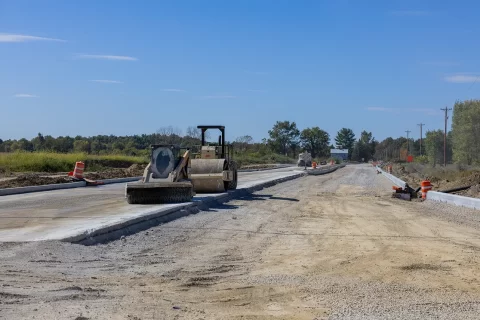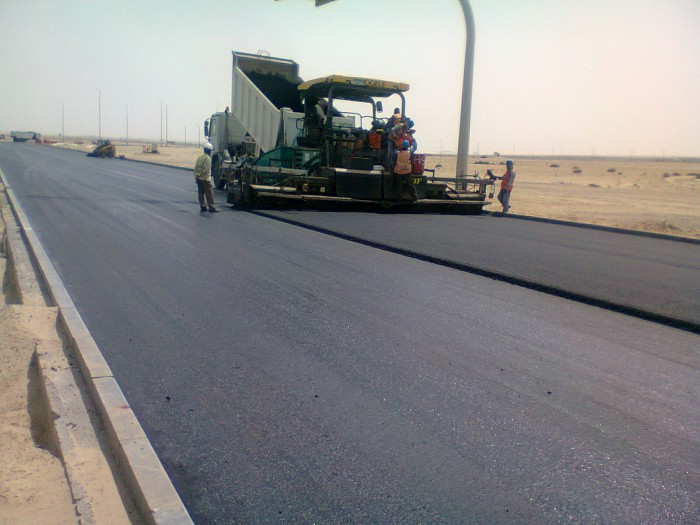Although African countries are registering impressive economic growth, the continent has been facing several challenges that are deterring its upward trajectory. Key among them is inadequate road construction in Africa. In recent years however, efforts have been made to foster African road connectivity in the continent. But are they enough to spur its growth?
By Anthony Kiganda
Road Construction in Africa is a scarce undertaking and where roads available they are largely poorly maintained. A survey carried out by the World Bank reveals that average road density in Africa is 20.4km per 100 square kilometers of land area. Worse still, of these only a quarter are paved. Southern Africa is the only region in Africa with a fairly good road transport system. South Africa in particular is reported to have 62km of road per 100km square kilometers close to the United States of America that has 67km of roads per 1000 square kilometer. This success story has been attributed to the country’s revitalization of its road and railway system before the FIFA World Cup of 2010.
The low road construction in Africa has had dire consequences. The effects of poor road connectivity in Africa can not be overemphasized. The World Bank notes that with poor road connectivity the cost of goods significantly goes up. For example, while to export a container from Hong Kong will only take 5 days and cost about US$575, it would take 12 days to export a container from Egypt at a cost of US$625. The cost triples and the journey takes over a month to move a container from Angola.
Trade between African countries themselves has also been hampered by poor road networks. A recent survey by PriceWaterhouceCoopers shows that majority of African countries have poor road connection and this has hindered any meaningful investment in Africa. In 2011 for instance, reveals the report, total intra-African trade represented only 11% of African trade with the rest of the world.
“Owing to poor low road construction in Africa job creation has stagnated because industrialization and manufacturing have tumbled,” quips Mr Ousmane Dore AfDB’s resident representative in Nigeria.
Policies for road infrastructure development
Road construction in Africa development is a challenge that resonates in all African countries. However, all is not doom and gloom. Major efforts are being applied to road infrastructure development in Africa. On average, Africa’s road connectivity has grown by 7,500km a year over the past decade. The Africa Development Bank names Tanzania and Lesotho as among the countries leading the pack in road connectivity with an annual increase of 15% and 24% respectively.
In a move that signals a bright future for Africa, the Cairo-Cape town highway which was revived in the 80s is set for completion in 2016. The road network is being developed in partnership with the African Union, the United Nations Economic Commission for Africa and the African Development Bank.

On the other hand, the Trans Sahara Highway which links several African countries is progressing well and maybe completed this year. The project aims to facilitate trade and regional integration between the Arab Maghreb Union, Economic Communities of West Africa and Central Africa States. The Trans Sahara Highway is part of a wider plan by Programme for Infrastructure in Africa (PIDA) to connect African capital cities. It is also supported by New Partnership for Africa Development (NEPAD) and the African Development Bank (AfDB).
The main goal of PIDA in boosting road connectivity in Africa is to enhance trade and spur economic growth. A survey conducted near Johannesburg by Africa Infrastructure Country Diagnostic (AICD)-a knowledge program on Africa’s infrastructure, clearly shows the importance of road connectivity. The study reveals that farmers who lived near a road steadily increased their yields as opposed to those living in far flung areas. This is because farmers near roads could quickly access inputs like fertilizers and seeds.
Private investment
For the Nigerian government, road infrastructure is a challenge it is ready to confront head on.
A new plan for infrastructure development with emphasis on roads development devised by the National Planning Commission, branded National Integrated Infrastructure Master Plan (NIIMP) estimates that $3tn will be required in the next 30 years to build and maintain adequate infrastructure supplies in Nigeria.
The plan shows investment requirements for key infrastructural sectors including; transport, regional development; information and communication technology; social infrastructure and security. Energy and transport have been allocated the lion’s share of funding estimated to be $1tn and $775bn respectively over a span of 30 years.
The Nigerian government and like-minded development partners have agreed that public resources can never be enough to help salvage road infrastructure challenges facing the country. This is especially because of plunging oil prices in the world market considering that oil is the biggest foreign exchange earner for Nigeria.
In this light, Nigeria has resorted like in some other African countries to private investment. Experts say that private partnership is a prerequisite if Nigeria is to boost its road network. “The private financing of infrastructure is necessary without which Nigeria’s infrastructure investment will be underdeveloped and the country will not attain its potential in economic growth” says Mark Tomlinson, director of the UK Department for International Development funded Nigeria infrastructure Advisory Facility (NIAF).
Annuity Financing Framework
Kenya on the other hand has been planning to build 10,000km road through alternative financing. The 5-year plan branded Annuity Financing Framework-where the private sector enters into financing agreements with the government for infrastructure projects-would see new roads built in a bid to foster investment and economic development in Kenya.
Kenya’s President Uhuru Kenyatta, who is spearheading the project, notes that only 14,000km of roads have been built in the country since independence.
According to President Kenyatta, the ambitious programme seeks to make Kenya not only a low-cost investment and trading destination, but also promote national integration and improve security due to connectivity of regions and communities.
The programme seeks to ensure that 2,000 kilometers of small roads have been completed within the 2014/2015 financial year. In the 2015/2016 financial year, 3,000 kilometers made up of 80 per cent small roads and 20 per cent highways will be done, whereas in the 2016/2017 financial year 5,000 kilometers, 80 per cent of which will be small roads and 20 per cent highways, will be completed.
With infrastructure seen as a prerequisite for poverty eradication and regional Integration, South Africa Development Community (SADC) developed the Regional Infrastructure Development Master Plan as a strategic framework guiding infrastructure development in Southern Africa. The Transport Sector Plan component of this Master Plan aims to identify key hubs for rehabilitation and development in order to improve the ability of passengers and goods to reach markets
Obstacles
The cost of road maintenance remains a monumental task for Africa as a whole. While African countries recognize the significance of a functional and integrated road network, funding is often diverted into other sectors. Additionally, corruption has been blamed for low road infrastructure network in Africa. There have been reports that funds that were meant to be put into the road network were mismanaged by governments in many countries. This has ensured that road construction in Africa still lags behind.
A World Bank study called the Africa Infrastructure Country Diagnostic (AICD) shows that weak project planning and management capacity is a major challenge as well facing road development in Africa. For instance, some government ministries are able to spend only about two thirds of their allocated infrastructure budgets at any given fiscal year. This can slow the pace of new construction and reduce the amount of money set aside for infrastructure since unspent funds are often directed to other programmes.
Resistance to road tolling to pay for roads by the public is also a major hindrance. The South African National Roads Agency, started electronic toll roads in Gauteng, South Africa’s richest province, in December 2013 to help pay for the 20 billion-rand upgrade of 201 kilometers of roads. Although the move was seen as a novel way of raising funds to build roads, it has not been warmly received as motorists and commuters protested high levies in addition to then normal tax burden on them. Consequently, the imposition of the fees was delayed for more than two years.
Nigeria emulated toll roads from South Africa to ensure successful management of roads. Lekki-Epe Express Toll Road is a major project to use the model and is the first of the public private partnership (PPP) infrastructure projects completed in 2011. However as in the case of South Africa,
motorist insist that tolling an Expressway in a city only worsens traffic jams and adds to an already heavy tax burden on them.
Although lack of funding is a major obstacle for road infrastructure development, African countries are countering this by tapping international capital markets with debut bond issues. A case in point is Zambia which sold its first dollar denominated bond in 2012 to fund its transport plans and other countres have followed suit.
Road are the vital arteries for a regions economic development and poor arteries therefore means anemic growth as has been demonstrated by several studies done in the past. Although there are clear efforts geared towards boosting road infrastructure in Africa, policy formulation and execution has emerged as the most daunting challenge facing African governments. With competing priorities for scarce resources governments will be forced to make tough decisions if sustainable growth is to be achieved.

Leave a Reply